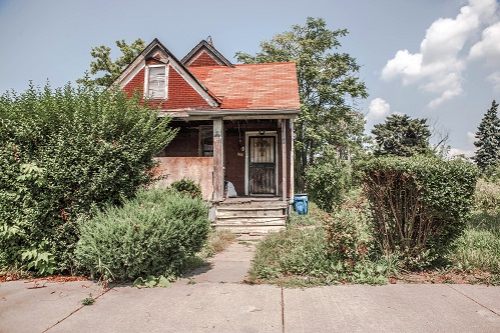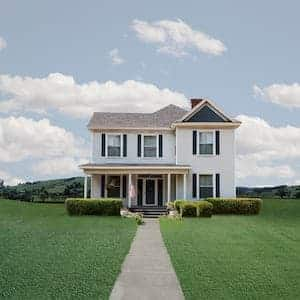- What is the difference between homeowners insurance and landlord insurance?
- Landlord insurance vs. homeowners insurance cost
- What does landlord insurance cover?
- Landlord insurance vs. umbrella policy
- Common landlord insurance claims
- Homeowners vs. landlord insurance when renting out a room in your home
- Landlord insurance application information
- How to change homeowners insurance to landlord insurance
- How to save on rental home insurance
- FAQ: Landlord insurance vs. homeowners insurance
What is the difference between homeowners insurance and landlord insurance?
The table below highlights the differences and similarities between homeowners insurance vs. landlord insurance:
| Coverage details | Homeowners insurance | Landlord insurance |
|---|---|---|
| Insured resides | In the home alongside the tenant | In the insured home, on the premises, or elsewhere |
| Protection | Main building and other structures on the property from losses due to:
| Same as homeowners insurance |
| Personal property | Most property is covered for specific perils anywhere in the world, including furniture, clothing and computers | Only covers items owned by you but used to service the rental property - such as maintenance equipment, furniture and appliances used by the tenant, snowblowers, etc. |
| Liability | You are protected when you're responsible for damage, regardless of where the covered event occurred | Covers accidents on the rented premises for which you are legally responsible |
| Tenant belongings | Not insured | Not insured. Experts recommend requiring tenants to carry renters' insurance |
Landlord insurance vs. homeowners insurance cost
Based on Insurance.com’s analysis of average home insurance rates in 2022, the average annual cost of homeowners insurance is $2,777.
Landlord policies cost approximately 25% more than a typical homeowners policy, according to the Insurance Information Institute. In the search for cheap landlord insurance, it's important to understand how rates are calculated and why it’s more expensive.
Several factors impact the cost of landlord insurance, says Chris O’Rourke, California-based vice president of property claims at Mercury Insurance.
The weather of the region in which the home or rental property is located or its proximity to forests or oceans can help determine the risk of a threat to a property, O’Rourke says. That is especially true if the property is located in an area prone to natural disasters, including hurricanes, tornadoes, hail storms and wildfires.
O’Rourke notes that the cost of coverage may also differ based on factors such as:
- Your region’s cost of living
- Your credit history
- The claims history of the property
- Various characteristics of the home and property, including the home's size, year built, type of roof, plumbing or other construction features
What does landlord insurance cover?
You can choose landlord coverage with the most basic protection, or you can insure against most kinds of losses. Ryan Scruggs, a Surprise, Arizona-based risk advisor with Farmers Insurance, explains that landlord insurance comprises three parts:
- Dwelling coverage. This covers the structure and reimburses you in case of fire, water, wind or hail damage, etc.
- Personal property coverage. This reimburses you for damage to any property you keep on the premises for maintenance or tenant use, such as appliances, furniture, garden equipment and snow blowers.
- Liability coverage. This reimburses for injuries to others on the rental property and for which you are responsible.
"In my opinion, liability is the most important coverage that can be offered on landlord policies," says Scruggs.
He also recommends that landlords consider expanded rent loss coverage.
"If your tenant is unable to live in the home due to a fire, sewer backup, mold, etcetera, this coverage can reimburse you for lost income during the period the tenant is not making rental payments," Scruggs says.
Note that there are also three categories of landlord coverage: DP-1, DP-2 and DP-3.
- DP-1 is the bare minimum, providing coverage for fire, vandalism, wind, hail and other common perils.
- DP-2 is more comprehensive, adding coverage for special hazards named to the policy.
- DP-3 is the most comprehensive policy, covering replacement-cost coverage for any perils not specifically excluded.
Monique Allan, a Mesa, Arizona-based financial advisor and registered representative with COUNTRY Financial, cautions that many landlord policies today have been stripped down to protect the carrier.
Water damage, vandalism, dog bite liability and other scenarios can be minimized or removed from coverage. Landlords who mistakenly believe most landlord policies offer the same coverage can fall into the trap of being under-protected, Allan says. She urges landlords to do their research and scrutinize any policy carefully.
To protect your interests, consider the following landlord coverage additions and options:
- Replacement cost coverage and extended replacement cost coverage. This provides replacement cost for your dwelling, allowing you to repair or rebuild the damaged or destroyed building without a depreciation deduction. Extended replacement cost coverage provides additional limited coverage above the dwelling limits to help provide coverage in cases where the construction cost exceeds the original coverage amount.
- Fair rental value coverage. This reimburses you for lost rent when your property is damaged and rendered uninhabitable due to a covered loss.
- Water damage coverage. This covers damages to the building or anything inside the building from flooding, sewer backups and other natural disasters.
- Short-term home-sharing endorsement coverage. This can protect your rental property if it’s listed through companies such as Airbnb or VRBO.
- Service lines and critical home systems coverage. This covers repairs for service lines on your rental property and protection for a wide range of critical home systems, such as appliances or electronics.
- Eviction expense reimbursement coverage. This provides limited coverage for specific expenses incurred due to an eviction action based on specified reasons, including non-payment of rent, breach of the rental or lease agreement and substantial damage to the home.
- Renter default protection. This pays for lost rental income if your tenant fails to pay rent, must be evicted due to a court order, undergoes hardship or dies unexpectedly.
Read more on what is landlord insurance.
Landlord insurance vs. umbrella policy
An umbrella policy provides additional liability coverage for the property owner beyond the amount available through a landlord policy.
Rental property owners might have increased liability exposure and more assets they need to protect. An umbrella policy can provide the landlord with additional coverage.
It provides coverage that extends beyond the limits of the main policy and covers things a landlord policy doesn’t. So, if you have $500,000 in liability on the landlord policy and face a $1 million claim, umbrella insurance can make up the difference.
Know more about an umbrella policy.
Common landlord insurance claims
According to the Insurance Information Institute, here are some common insurance claims you might face when renting out a house, their average cost and how to avoid them.
| Damage type | Description | Average claim cost | Prevention |
|---|---|---|---|
| Water | Poor plumbing or failing pipes cause significant water leakage | $10,849 | Check and maintain pipes, especially in winter. Inform tenants where the emergency shutoff is and how to use it. |
| Accidental damage to property | Applies to the contents of the unit, including carpets, appliances, countertops, etc. | $13,687 | Require a sufficient damage deposit to avoid insurance claims and vetting tenants carefully. |
| Storm | Forces of nature, such as wind and hail | $11,200 | Make sure your roof is in good repair and that pipes and gutters are sturdy, properly secured, and unblocked. Reinforce doors and windows with plywood coverings outside the glass in advance of big storms. |
| Bodily injury and property damage | Injuries caused by trips, slips, falls, falling objects, etc. as well as damage sustained to your property | $26,872 | Remove snow and ice from walkways, and eliminate trip and slip hazards from your flooring, driveways and walkways. |
Homeowners vs. landlord insurance when renting out a room in your home
Do you need special homeowners insurance for landlordsif you just occasionally rent out a room through Airbnb or other services? It depends.
If you rent out all or part of your house for a short period – for instance, over a single holiday period or during a major sporting event -- you've got a few options for insurance protection:
- The referral service – such as Airbnb – might have its own host protection policy.
- Your current insurer might allow you to take in a short-term boarder at no additional charge.
- Your insurance company might sell you an endorsement (or rider) for your current policy that gives you coverage.
- If you plan to take in short-term boarders regularly, you may need to insure for business activities. This is something done by a bed and breakfast or small hotel, for example.
The most important thing is that you let your insurer know what you're doing and ask questions about landlord vs. home insurance, as well as anything you are unsure about. If something happens and you did not notify your homeowners insurance company about your tenants, the claim could be denied.
Landlord insurance application information
To apply for a landlord policy, you will need the following information:
- Property address
- Current property value
- Date of purchase and purchase price for the property
- A list of system upgrades and improvements, especially electrical, plumbing and HVAC
- Current or recent rental property insurance policies and your claims history record
- A list of all safety and security measures, including burglar alarms, motion sensors, fire sprinkler systems, guard and security gates
- A list of potential hazards, including fireplaces or wood stoves, swimming pools, hot tubs and gym equipment
- A copy of your standard lease agreement
- Desired coverage, including loss of income, windstorm, flood and umbrella liability
- A list all additional structures on the property, such as garages, laundry facilities and storage buildings
- A list of employees and their functions, such as grounds maintenance, housekeeping and office staff
How to change homeowners insurance to landlord insurance
If you need to switch from a homeowners insurance policy to a landlord insurance policy because you’ve decided to rent out your home, do so immediately. Failure to do so can leave you vulnerable and unprotected should your home be damaged.
Say you plan to vacate your home for an extended period – perhaps to travel or due to an extended stay in a medical facility. If you plan to rent your vacant home out during this time, “it’s possible and recommended to make the change from a homeowners policy to a renter’s policy,” Allan says.
Contact your insurance company to find out what steps are required to change the policy over.
How to save on rental home insurance
You can save on a landlord policy the same way you can on your homeowners policy. Tips for cutting costs include:
- Bundling your landlord policy with your auto and other policies
- Improving your credit rating
- Raising your deductible
- Adding an umbrella policy
- Comparison shopping for insurance
In addition, there are some landlord-specific actions you can take to reduce your costs.
Maintain your property. Well-maintained homes typically have fewer claims, and you can be rewarded with lower premiums. So, have your plumbing system checked regularly, install hard-wired smoke detectors and keep walkways in good repair, among other measures.
Prohibit renters from smoking. Smoking increases the chance of property damage. Give the place a deep clean, add a no-smoking rule to your standard lease agreement and request a non-smoking discount from your insurer.
Require renters insurance. Another way to reduce your insurance premiums is to require that your tenants carry renters insurance that protects their personal property and provides liability coverage if their guests are injured on your property.
As the landlord, you insure your own possessions. There is no personal property coverage for your tenant included in your landlord policy. To avoid litigation if your tenant's personal property is stolen or damaged, you can require a tenant to buy renters insurance as part of the lease agreement.
Add safety equipment and new systems. Describe for your insurer everything you do to improve the safety of the property. Alarm systems, security cameras and motion detector lighting may make your property less appealing to burglars and more attractive to insurance underwriters.
Minimize claims. As with homeowners insurance, the fastest way to increase your premiums is to file a claim. So, unless you experience major, expensive damage, try not to file a claim.
FAQ: Landlord insurance vs. homeowners insurance
Do I need both homeowners insurance and landlord insurance?
If you rent a room in your owner-occupied home, you typically only need a homeowners insurance policy. But check with your insurer to be sure. If the home you own is a traditional rental property, you will likely need a separate landlord insurance policy.
Is landlord insurance more expensive than homeowners insurance?
Rates depend on a lot of factors, but a landlord policy usually costs more than a home insurance policy since it involves greater liability risk.
Is it worth getting landlord coverage?
Yes. Anyone who owns a rental property of any value should have landlord coverage. It’s essential to protect yourself so that you are not on the hook financially to fix major damages or to reimburse someone who is seriously injured on the property.
Who has the best landlord coverage?
The best landlord insurance company and policy for you will depend on your needs and budget. It’s smart to shop around and request quotes from several different insurance companies to make a more informed decision. Research each insurance company carefully before you buy.




